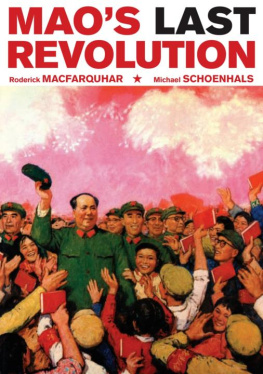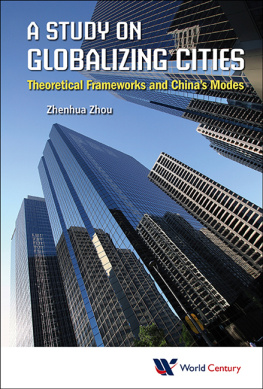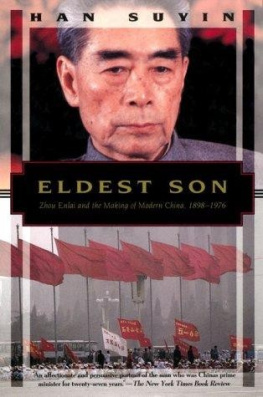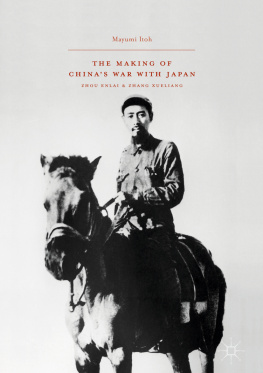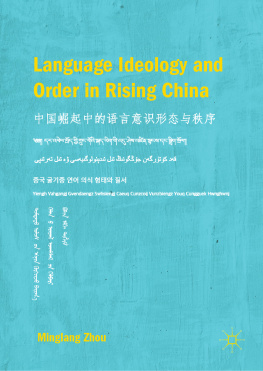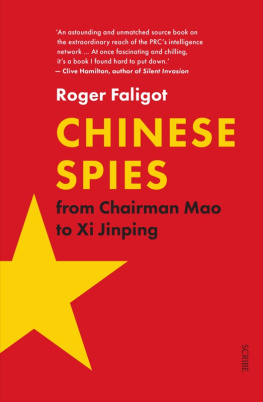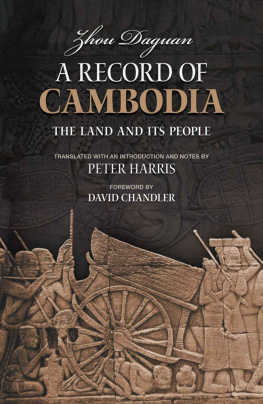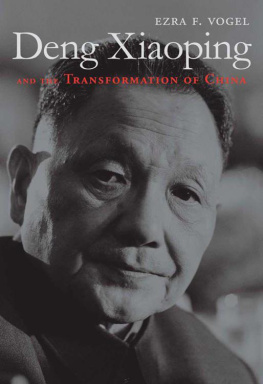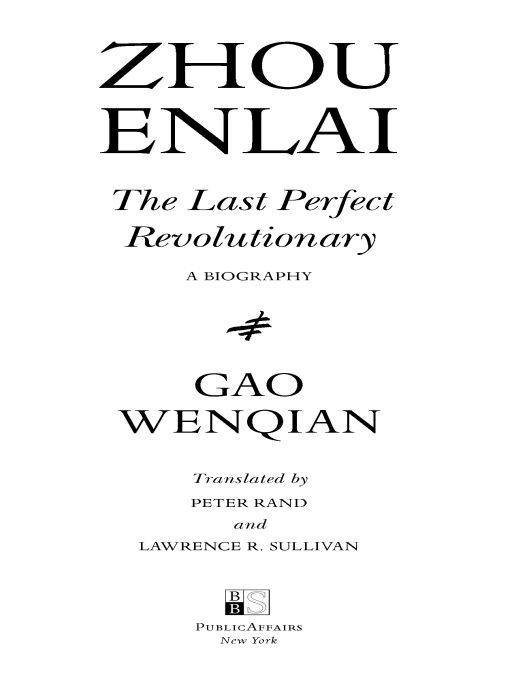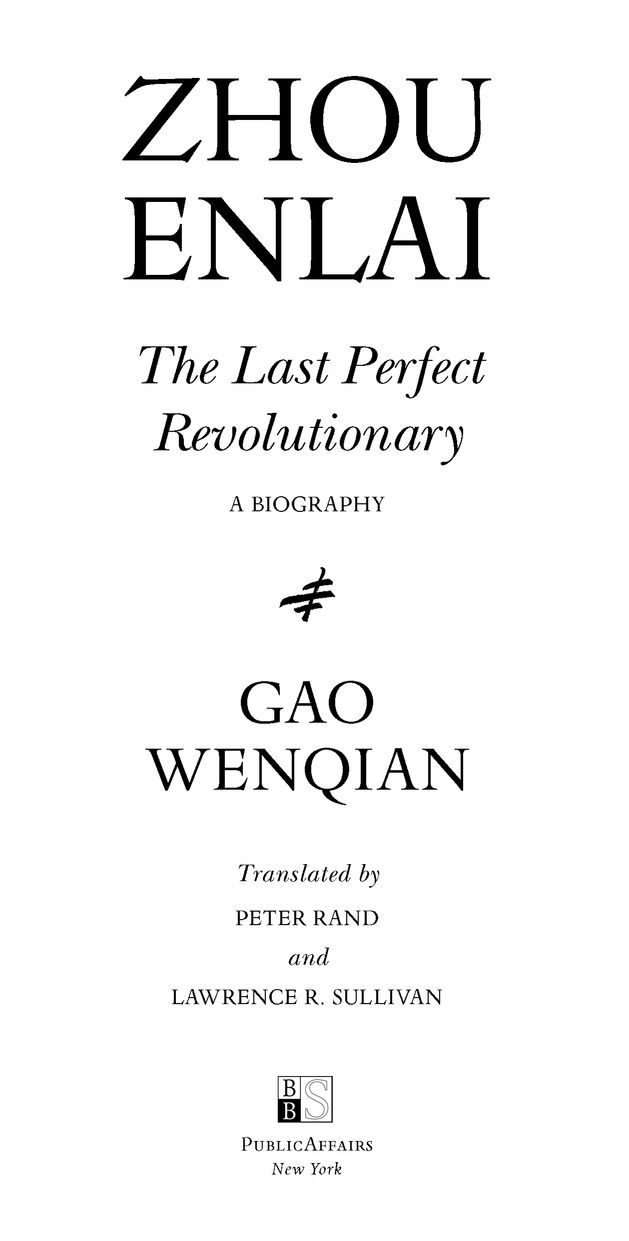Table of Contents
To the memory of
my mother Fu Xiu,
who had encouraged me
to tell the truth
to the Chinese people.
INTRODUCTION
Andrew J. Nathan
OF ALL THE MYTHS OF THE CHINESE LEADERS, THAT OF ZHOU Enlai has been the hardest to crack. The Chinese Communist Party tore down most of its former heroes in internal purgesJiang Qing and those lumped with her as the Gang of Four, Lin Biao and his generals, the secret police chief Kang Sheng, and Maos ghostwriter Chen Boda. The great oak of Mao was one of the last to fall, hollowed out by memoirs from his Cultural Revolution victims and their families and then by revelations from his private physician. Few Chinese were surprised: they had whispered about his personal cruelties and sexual indulgences for years.
But Zhou remained immaculate. While most Chinese have long known that his official image was too good to be true, they had no details: he was too skilled at hiding his tracks. The facts about Zhous strange personality and its tragic consequences for China have now come out thanks to the personal odyssey of Gao Wenqian, a one-time researcher-writer at the secretive Chinese Communist Party Central Research Office for Documentation (Zhonggong zhongyang wenxian yanjiushi).
Like many dictatorial regimes, the Chinese Communist Party obsessively collects its own documents and with equal obsessiveness keeps them secret. National-level Party and state civilian archives reaching back to the early history of the Communist movement and up to the recent past are kept by the Central Archives (Zhongyang danganguan), located in a large walled and guarded compound more than twenty miles to the northwest of Beijing. Local government archives, military archives, and archives of the pre-1949 Nationalist regime are held elsewhere. Drafts and originals of official telegrams, reports, decisions, meeting minutes, and the like are sent to the archives by leaders offices, Central Committee departments, and government ministries after having been kept in their original units for a number of years. The archives also collect photographs, tape recordings, interview transcripts, and other documentation.
In the past the archives were off limits except, in rare cases, to high-ranking Party officials. Today, the materials are used by official compilers, who can see documents relevant to their assigned projects strictly on a need-to-know basis, by appointment at the archives complex, with access to sensitive materials graded by the compilers rank. Their job is to write and rewrite history to fit the changing official line. Mr. Gaos unit in the Central Archives was tasked with compiling the chronologies, biographies, and collected works of Mao Zedong, one-time head of state, Mao rival Liu Shaoqi, Mao aide and post-Mao leader Deng Xiaoping, economic decision-maker and Party elder Chen Yun, and, of course, Premier Zhou Enlai.
It was on the Zhou projects that Gao chiefly worked for fourteen years. He focused on the period from the start of the Cultural Revolution in 1966 to Zhous death in 1976. He also participated in work on Zhous youth and career in the Party up to 1949, and in research on Maos role in the Cultural Revolution, a role which, of course, was central to the high politics of that period. In this way, he came to know more about Zhous life and character than perhaps anyone who had not worked directly with the premier, and more about the high-level politics of the Cultural Revolution than any but a few participants and Party researchers.
Gao Wenqians research in the secret Party archives allows for the first fully human portrait of Chinas premier. Rather than the Zhou Enlai of legend, Gao portrays a complicated man, whose skill at adapting to Mao Zedongs mercurial moods enabled him to survive the Cultural Revolution relatively unscathed and to break ground in relations with the Western world. At the same time, his even-handed treatment reveals Zhous culpability in serving Mao Zedongs destructive whims during the Cultural Revolution.
Gao shows insight into all the main actors of the Cultural Revolutionthe suspicious Mao, the trusting Liu Shaoqi, the raucous Jiang Qing, the stubborn Deng Xiaoping. The rolling power struggles of that period, it turns out, were the result less of competing ambitions among leading politicians than of Maos machinations, fostered by his constant suspicions of those he had himself promoted. Gao shows how Mao launched the Cultural Revolution out of unfounded jealousy of Liu Shaoqi, how he pushed an unambitious Lin Biao into power and then manipulated him into fleeing the country, how he created and secretly sustained the group he himself eventually labeled the Gang of Four while keeping a public distance from them, and how Mao brought Deng Xiaoping back to power from internal exile not to assist Zhou Enlai but to counterbalance him.
But Gaos most important revelations concern Zhou and his relationship with Mao. In order to bring Zhou to life, Gao masterfully interprets his opaque, evasive language, a style that Zhou cultivated in order to avoid triggering Maos anger. He shows Zhou straining to interpret Maos wishes, to support Maos changing line, and to absorb Maos unpredictable attacks. He portrays Maos cruelty to Zhou in his last yearshis denial of medical treatment for bladder cancer and the exhausting, humiliating political inquisition he forced on Zhou in the last months of the premiers life, an inquisition based on fake evidence and aimed at destroying any legacy the dying premier would leave for those who might try to reverse Maos line after his own death.
The mystery is less Maos sadism, which has been exposed by numerous writers, but Zhous submission. When Mao denied him an operation he complied, when Mao subjected him to unjust criticism he hastened to criticize himself. Gao shows that Zhou had made a decision relatively early in his career as a revolutionary, which he stuck to until the end of his life: not to challenge Mao. This was the tragic rigidity in the character of this most flexible of men.
Although Party historians have attacked Gao for desanctifying Zhou, it would be more accurate to say that he shows sympathy for Zhous own regret for his role in the Cultural Revolution. Gao gives Zhou credit for softening the impact of Maos policies, for protecting a number of people, for keeping the country going, for trying to restart the economy, and for achievements in foreign affairs. Yet he also makes clear that without Zhous support Mao could not have kept the disaster going as long as he did. Mao needed Zhou. Although Zhou may not have had the power to overthrow Mao, he could have withdrawn his support (paying, to be sure, the ultimate personal price) and Mao would have been unable to go on as long as he did. By working to mitigate the effects of Maos rampages rather than to oppose them, he became Maos enabler. Even on Zhous deathbed, when he suffered over the memory of the things he had done against his own convictions, he devoted his small remaining energy to self-denunciations aimed at preventing Mao from purging him.
Why? Not because he believed in what Mao was doing: Gao makes clear that Zhou was under no illusion that Maos maneuvers were good for the country or needed for the revolution. It was because of a deep-seated need to affiliate, an inability to take existential risks, a psychological need to be another leaders number two. Gao traces this attribute to Zhous childhood as the beloved child of two mothers (one biological and one adoptive) who lacked an active father, and who was thoroughly trained in the Confucian arts of yielding, tolerance, and compromise. On Gaos analysis, it was during a series of intra-Party struggles in the early 1930s and in the 1940s during the Yanan purges that Zhous servant mentality found its master. In a series of fierce conflicts Zhou found himself demoted from a top position in the Party to the status of Maos indispensable yet despised assistant.


